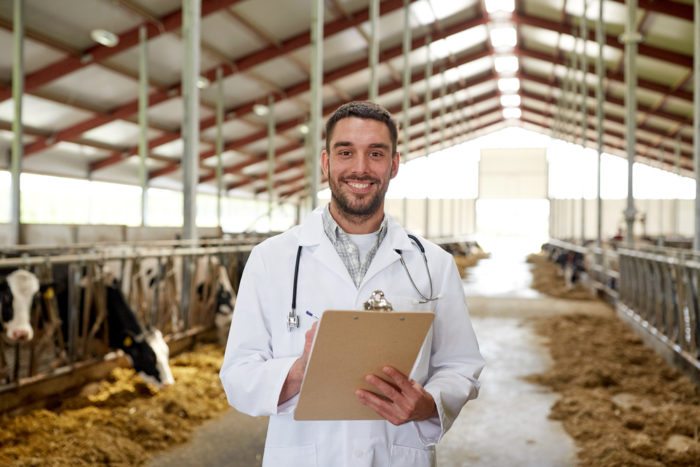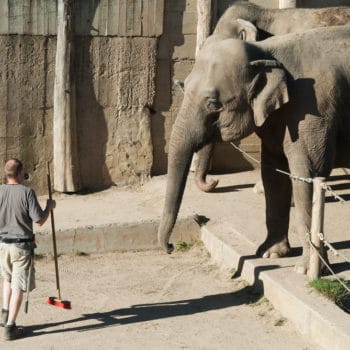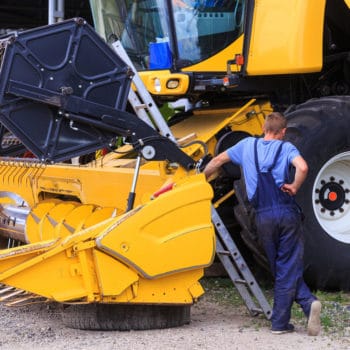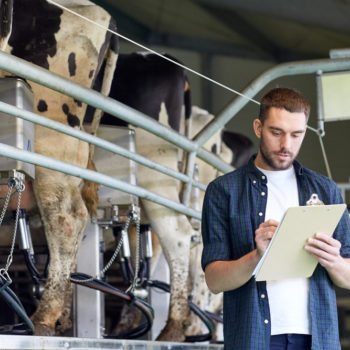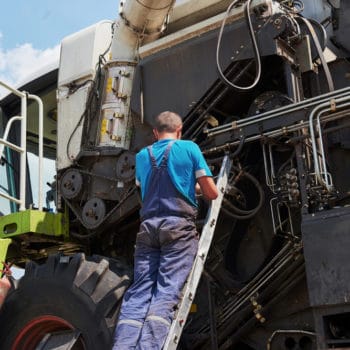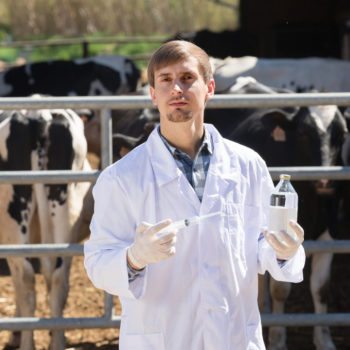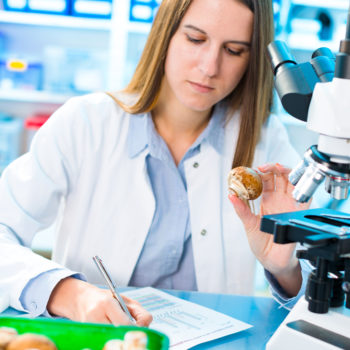Why We Love It
-
$71,830Potential Avg. Salary
-
10.3%Job Growth Rate
-
Growing DemandJob Outlook
-
Green JobsCareer Attribute
Animal scientists are animal breeders and researchers that focus their studies on the production of animals with desirable traits. An animal scientist may work to establish a breed of dairy cows that produces large amounts of milk, or to grow the population of a desirable breed of dog or cat.
Recommended Schools
What is an Animal Scientist?
The following job responsibilities are common for individuals in animal scientist roles:
- Conduct scientific research to identify animals with desirable traits
- Conduct breeding activities to expand the population of animals with desirable traits
- Use science to enable farms and food producers to produce larger quantities of food
- Study the eating patterns of animals to formulate recipes for healthy pet food
- Educate farm and pet owners on how to properly care for animals
A Day in the Life
Animal scientists are concerned with how humans utilize and care for both farm and domestic animals. This leads animal scientists down many different career paths. One form of animal scientist is a domestic animal breeder. Breeders use their knowledge of the reproduction systems and behaviors of domestic animals to grow populations of desirable breeds. These breeds can then be sold for a number of uses: to work as seeing-eye dogs, adequately function as barn cats, or to make protective and loving pets.
Another type of animal scientist is focused on animals used in agriculture. These animal scientists focus their work on cows, pigs, sheep, chickens, and horses. They breed animals to grow populations on farms and to extend the desirable traits of one generation to another. For example, an animal scientist may work to extend the population of strong horses that are capable of moving heavy farm equipment without tiring, or to extend the gene pool of cows that produce higher than normal amounts of milk.
Beyond studying and breeding animals, animal scientists are also concerned with the health and welfare of animals. They may work with pet food manufacturers to create recipes for domestic animal food that ensure pets receive adequate nutrition. They may work with farm owners to teach farmers about the environments and diets that different types of livestock need to thrive. They may also work in animal welfare organizations, investigating suspected acts of animal cruelty in order to protect animals.
Typical Work Schedule
There is no typical work schedule for animal scientists. While some may work for corporations and work normal business hours, others work in their homes and take care of the animals they breed throughout all hours of the day and over the weekend. Animal scientists who work in agriculture may begin their day before the sun comes up and end it at sunset.
Projected Job Growth
Using scientific research, animal scientists are capable of increasing overall food production. Because food production needs to increase to support a growing world population, the demand for animal scientists is expected to grow in the coming decade.
Typical Employers
Food scientists can work for a number of employers in various industries. Some work in research for engineering companies, food production companies, colleges, or government agencies. Others may be self-employed or work for non-profit animal rights organizations or in law enforcement.
Recommended Schools
How To Become an Animal Scientist
Formal education is usually only required for animal scientists who work in the research industry. For general domestic or farm animal breeders, a high school diploma may be a sufficient level of education. The most important characteristic of an animal breeder is a thorough understanding of the animals they breed and an understanding of their reproduction systems. Many livestock breeders are trained on farms where they work with animals every day and learn how to care for and inseminate livestock. Many domestic animal breeders learn from other experienced breeders in the field.
However, to work as an animal scientist for a non-farm business, you’ll likely need to have a bachelor’s degree. Most aspiring animal scientists pursue bachelor of science degrees in animal science with a specialization in their field of interest. For example, students may choose to specialize in livestock business and marketing, animal reproduction science, or animal welfare and behavior. Each of these specializations provides a thorough education in the focus you hope to have in your career.
To conduct research, you’ll likely need to continue your education and earn a master’s degree. With a master’s degree in animal science or a related field, you’ll qualify for positions where you can conduct research experiments and studies in the field, and you will also be more competitive for upper-level positions for the companies you work for. Commonly, a master’s degree is required for animal scientists who aspire to move into management positions.
Animal Scientist Salary Data
We’ve provided you the following to learn more about this career. The salary and growth data on this page comes from recently published Bureau of Labor Statistics data while the recommendations and editorial content are based on our research.
National Anual Salary
Low Range
$46,180Average
$71,830High Range
$120,500National Hourly Wage
Low Range
$22/hrAverage
$35/hrHigh Range
$58/hrHow do Animal Scientist salaries stack up to other jobs across the country? Based on the latest jobs data nationwide, Animal Scientist's can make an average annual salary of $71,830, or $35 per hour. On the lower end, they can make $46,180 or $22 per hour, perhaps when just starting out or based on the state you live in.
Salary Rankings And Facts
#185 Nationally for All Careers
Above Average Salary Nationally
Programs and Degrees
Here are the most common degrees for becoming an Animal Scientist. a is usually recommended and specifically a degree or coursework that prepares you for the particular field, see below.
Highest Education Among Animal Scientists
- 14.2% Doctorate
- 21% Masters
- 45.8% Bachelors
- 8% Associates
- 10.9% College
- 0.2% High School
- 0% Less than High School
Job Growth Projections and Forecast
2014 Total Jobs
2,9002024 Est. Jobs
3,200Job Growth Rate
10.3%Est. New Jobs
300How does Animal Scientist job growth stack up to other jobs across the country? By 2024, there will be a change of 300 jobs for a total of 3,200 people employed in the career nationwide. This is a 10.3% change in growth over the next ten years, giving the career a growth rate nationwide of Above Average.
Growth Rankings And Facts
#179 Nationally for All Careers
Above Avg. Growth Nationally
What Companies Employ The Most Animal Scientists
| Industry | Current Jobs | New Jobs Needed | % Increase |
|---|---|---|---|
| Colleges, universities, and professional schools; state | 900 | 100 | --- |
| Research and development in the physical, engineering, and life sciences | 500 | --- | --- |
| Support activities for agriculture and forestry | 400 | 100 | 0% |
